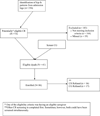Recruitment of Older Adult Patient-Caregiver Dyads for an Online Caregiver Resource Program: Lessons Learned
- PMID: 23549905
- PMCID: PMC3580773
- DOI: 10.1007/s12126-011-9128-x
Recruitment of Older Adult Patient-Caregiver Dyads for an Online Caregiver Resource Program: Lessons Learned
Abstract
Hip fracture is a significant health problem for older adults and generally requires surgery followed by intensive rehabilitation. Informal caregivers (CGs) can provide vital assistance to older adults recovering from hip fracture. Caregiving is a dyadic process that affects both CGs and care recipients (CRs). In a feasibility study, we assessed the effects of using a theory-based online hip fracture resource program for CGs on both CGs and CRs. In this article, we discuss our recruitment process and the lessons learned. Participants were recruited from six acute hospitals, and CGs used the online resource program for 8 weeks. A total of 256 hip fracture patients were screened, and 164 CRs were ineligible. CG screening was initiated when CRs were determined to be eligible. Among 41 eligible dyads, 36 dyads were recruited. Several challenges to the recruitment of these dyads for online studies were identified, including a low number of eligible dyads in certain hospitals and difficulty recruiting both the CR and the CG during the short hospital stay. Field nurses often had to make multiple trips to the hospital to meet with both the CR and the CG. Thus, when a subject unit is a dyad recruited from acute settings, the resources required for the recruitment may be more than doubled. These challenges could be successfully alleviated with careful planning, competent field staff members, collaboration with hospital staff members, and efficient field operations.
Keywords: Caregivers; Dyads; Hip Fracture; Online Studies; Recruitment.
Similar articles
-
Feasibility and Efficacy of Life Review Delivered by Virtually-Trained Family Caregivers.J Alzheimers Dis. 2023;95(2):573-583. doi: 10.3233/JAD-230371. J Alzheimers Dis. 2023. PMID: 37545241
-
Use of discussion boards in an online hip fracture resource center for caregivers.Orthop Nurs. 2013 Mar-Apr;32(2):89-95; quiz 96-7. doi: 10.1097/NOR.0b013e318289fa22. Orthop Nurs. 2013. PMID: 23518751 Free PMC article.
-
A theory-based online hip fracture resource center for caregivers: effects on dyads.Nurs Res. 2012 Nov-Dec;61(6):413-22. doi: 10.1097/NNR.0b013e318270712a. Nurs Res. 2012. PMID: 23052420 Free PMC article.
-
Dyadic Interdependence in Non-spousal Caregiving Dyads' Wellbeing: A Systematic Review.Front Psychol. 2022 Apr 29;13:882389. doi: 10.3389/fpsyg.2022.882389. eCollection 2022. Front Psychol. 2022. PMID: 35572327 Free PMC article.
-
The effectiveness of dyadic interventions for people with dementia and their caregivers.Dementia (London). 2013 Nov;12(6):821-39. doi: 10.1177/1471301212447026. Epub 2012 May 21. Dementia (London). 2013. PMID: 24337642 Review.
Cited by
-
Recruitment of older adult-caregiver dyads during the COVID-19 pandemic: an example from a study to evaluate a novel activities of daily living (ADL) sensor system.Front Dement. 2023 Oct 19;2:1271754. doi: 10.3389/frdem.2023.1271754. eCollection 2023. Front Dement. 2023. PMID: 39081978 Free PMC article.
-
Perceived Anxiousness About COVID-19 and Preventive Behaviors Among Dyads of Older Adults and Family Caregivers.Gerontologist. 2024 May 1;64(5):gnad122. doi: 10.1093/geront/gnad122. Gerontologist. 2024. PMID: 37656168 Free PMC article.
-
Patient-clinician digital health interventions for the hip fracture population: a scoping review.BMC Health Serv Res. 2023 Oct 2;23(1):1052. doi: 10.1186/s12913-023-09784-y. BMC Health Serv Res. 2023. PMID: 37784118 Free PMC article.
-
The Role of Filial Piety in Dyadic Recruitment of Chinese American Parents With Type 2 Diabetes and Their Adult Children.J Transcult Nurs. 2023 May;34(3):218-228. doi: 10.1177/10436596231159013. Epub 2023 Mar 17. J Transcult Nurs. 2023. PMID: 36927285 Free PMC article.
-
Comparing emergency department versus high school-based recruitment for a hypertension research study with adult-youth dyads.J Clin Transl Sci. 2024 Sep 16;8(1):e122. doi: 10.1017/cts.2024.586. eCollection 2024. J Clin Transl Sci. 2024. PMID: 39351500 Free PMC article.
References
-
- Adams C. Quality of life for caregivers and stroke survivors in the immediate discharge period. Applied Nursing Research. 2003;16:126–130. - PubMed
-
- Amador TK, Travis SS, McAuley WJ, Bernard M, McCutcheon M. Recruitment and retention of ethnically diverse long-term family caregivers for research. Journal of Gerontological Social Work. 2006;47(3–4):139–152. - PubMed
-
- Balducci C, Mnich E, McKee KJ, Lamura G, Beckmann A, Krevers B, et al. Negative impact and positive value in caregiving: validation of the COPE index in a six-country sample of carers. Gerontologist. 2008;48:276–286. - PubMed
-
- Bandura A. Self-efficacy: The Exercise of Control. New York: Freeman; 1997a.
-
- Bandura A. Health promotion from the perspective of social cognitive theory. Psychological and Health. 1998;13:623–649.
Grants and funding
LinkOut - more resources
Full Text Sources

